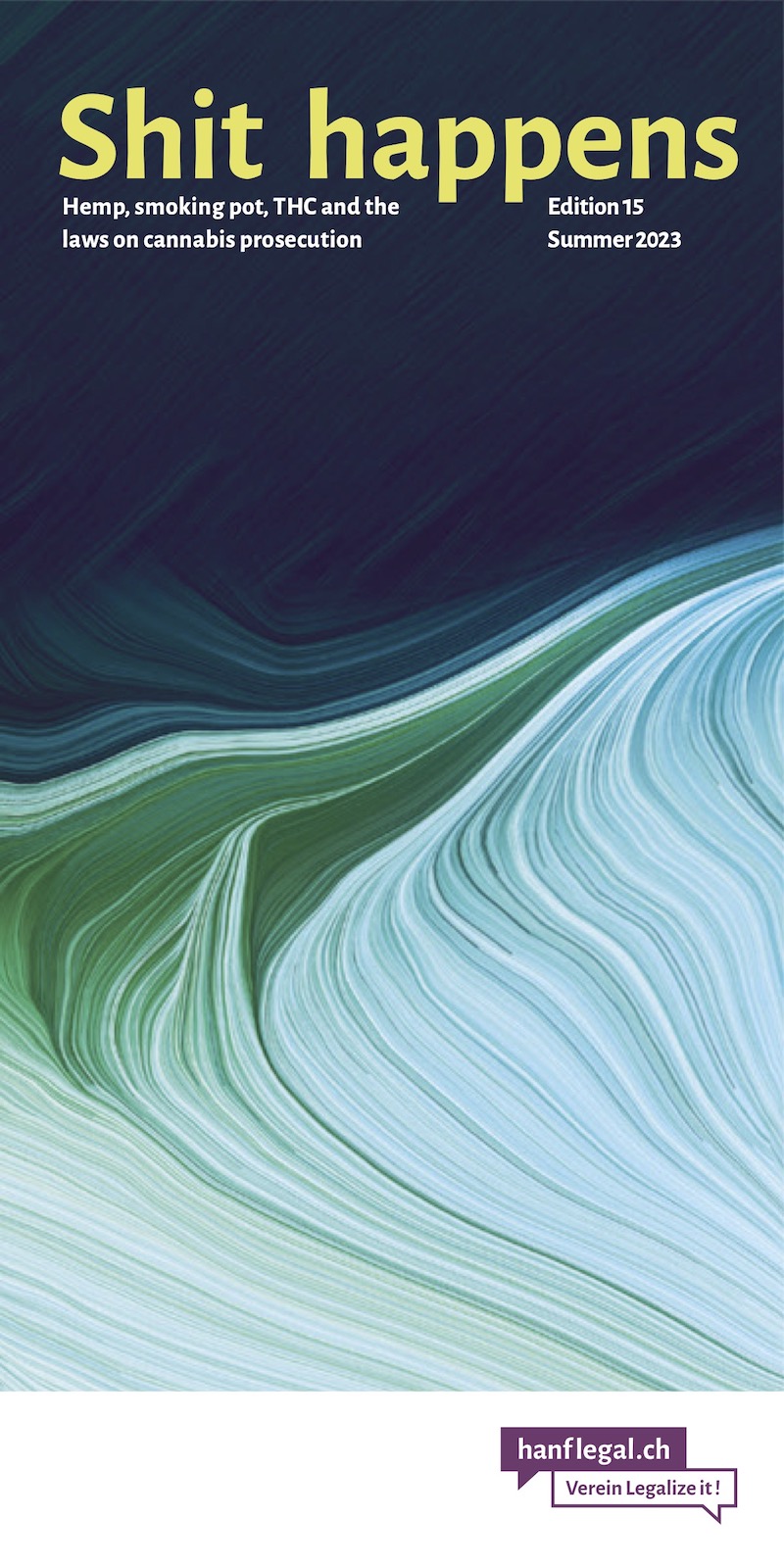- THC & Law:
Table of Contents
Development fixed penalties
 |
Spring 2015: A year fixed penalties, but not always!
Fixed penalties for observed cannabis use are issued by the police in practically all cantons, in some more frequently, in others less so. However, they seem to account for only a very small part of cannabis repression (a few thousand cases per year). In most cases, the persons concerned are still questioned and reported (tens of thousands of cases per year). The figures for the whole of 2014 will be available in spring 2015.
But beware: even those who are just walking around with a joint are not entitled to a fixed penalty. Again, we have seen a case where a THC user had to go to the station, was questioned and reported - and even had to endure a house search, even though the person only had a single lit joint. There is simply no certainty here to always get away with a fixed penalty, even if you meet the conditions for it.
Summer 2014: The fixed penalties are reality
A total of 2,198 fixed penalties were issued for cannabis use in the three months from October to December 2013 (fines for use of a narcotic drug of the cannabis effect type by adults, 2013. The table can be found at the bottom of the page.). Virtually all cantons are included in the statistics. Only Appenzell Innerrhoden does not show fixed penalties, but there are few referrals there anyway. Geneva and Jura only introduced fixed penalties on January 1, 2014, so they did not yet issue fixed penalties for cannabis use in 2013. Ticino has only started as of 1.7.2014. Thus, all cantons have now implemented fixed penalty.
However, one must see: The normal reprimands have reached over 50,000, which makes the fixed penalties rather a marginal issue, even when extrapolated to a full year. The 2014 statistics will probably show how these figures develop.
At any rate: it seems that all cantons have been introduced fixed penalties for cannabis consumption. So anyone caught smoking pot and with less than 10 grams should in the vast majority of cases receive a fixed penalty over 100 francs. It is true that the application of the fixed penalty procedure is obligatory for the police, if it is stated so in their service order. However, one must not now think that one has a “right” to this fine.
Because as it says in a presentation of the city police Zurich: “The fixed penalty procedure is excluded (…) if at the same time other violations against the NarcA (…) are present, which cannot be punished in the fixed penalty procedure (e.g. continuous consumption).” This is more than elastic - what is continuous consumption? But one thing is for sure: Whoever brags to the police about his or her use of potheads can very well be reported in the normal way, even if less than 10 grams are involved.
The small amount and the fixed penalty in practice
Fixed penalties for cannabis use has been possible throughout Switzerland since October 2013. However, the cantons still had to implement the new provisions. Finally, the police forces had to apply the law. How do they interpret the amended NarcA in everyday life?
Implementation takes time
We cannot yet provide a complete overview of the situation in all cantons. We have documented too few cases for that so far. But it is clear that fixed penalties is being distributed, even though some cantons only started doing so on January 1, 2014. However, there are still referrals for acts that could be punished with a fixed penalty… The picture is not clear yet.
The content in short
We assume that there are currently the following levels of illegality:
- quasi-legal possession up to 10 grams, without consumption ⇒ no punishment
- little illegal consumption in front of police eyes and possession up to 10 grams ⇒ fixed penalty 100 francs
- normal illegal consumption and possession for personal use ⇒ report, fines and fees between 100 and 1000 francs
- highly illegal transfer and sale ⇒ report, fine/imprisonment, fine, entry in criminal record
From legal text to police practice
The legal text is ultimately only relevant to a limited extent. What is central is how the police proceed in concrete cases (and, in a second step, how the courts judge the cases, if they are called upon at all). We were curious to see how the implementation would go. Above all, the fact that the mere possession of a small amount (10 grams) of cannabis is not punishable, would not please the investigating authorities at all, that was our thesis. And this exemption from punishment only applies to the preparatory acts up to consumption. We would have thought (and written so in Shit happens 9) that the police in this case would question those picked up with a few grams and could thus determine further consumption (which is always illegal) - and then they could have reported them for these acts (a fixed penalty seemed to us not possible for this, since this may be issued only for police-observed consumption).
The first cases
It was astonishing when the first cases were reported from Zurich and Winterthur: There were people who were just mixing and still received a fixed penalty. Or people who had only a few grams on them without consuming and also received a fixed penalty without further clarification (interrogation, protocol). So, at least in Zurich, the police seemed to ignore the impunity of the minor amount. They had done this before, but now the 10 grams were really defined (before there was no specific amount). It is a mandatory provision that this is exempt from punishment.
The service order of the Cantonal Police Zurich
The solution was found when a copy of the service order of the KaPo Zurich turned up. It is only a copy of the text, without letterhead/details. But we consider the document to be genuine, it matches the real observed cases and can explain the police action.
In this service order, which is binding for the police, the following possibilities are given under the title “Case constellations with adults”:
- Observed consumption without possession ⇒ fixed penalty
- Observed consumption with possession up to 10 grams ⇒ fixed penalty
- Observed consumption and possession over 10 grams ⇒ report in due process. (If possession for personal use, then report to the misdemeanor criminal authority; if possession for transfer, then report to the public prosecutor.)
- Possession up to 10 grams of cannabis NOT for personal consumption ⇒ Report to the public prosecutor
- Possession up to 10 grams for own consumption ⇒ fixed penalty
Comparison with our interpretation
All points agree with our interpretation, only the last point, which seems to us to be incorrectly implemented. The mere possession of up to 10 grams is simply exempt from punishment. The reasons:
- Fixed penalties cannot be issued for possession, only for observed consumption.
- Therefore, the legislature had to make a small amount of possession exempt from punishment, otherwise most of the people involved would have always continued to be reported for possession.
- Fixed penalties can only be issued for a single illegal act. If now the possession of up to 10 grams would already be an illegal act, then no fixed penalties could be issued at all if consumption and possession come together. Only fixed penalties could be issued for sole consumption without possession. Because, “The fixed penalty procedure can only be applied if cannabis consumption is the only offense to be punished.” This is stated in the report of the Commission for Social Security and Health of the National Council of September 2, 2011 on page 8209.
- Our interpretation is supported by the text of the law, by the logic of the fixed penalty bill and by the explanatory notes to the law: “Only the cannabis product that is actually consumed at the moment when cannabis consumption is established can be confiscated.” And, “A minor amount of cannabis that the offender is only carrying cannot be confiscated, as the possession of minor amounts of a narcotic drug … shall be exempt from punishment.” Both quotes can be found on page 8210 of the same report(Report of the Commission for Social Security and Health of the National Council of 2.9.2011).
- The Federal Commission on Narcotic Drugs also writes in its latest report (Current Regulatory Models, January 10, 2014, page 4): “… the prohibition on consumption does not apply without restriction: It is not a punishable offense at all for anyone who prepares only a minor quantity of a narcotic for his own consumption or gives it free of charge to a person of more than 18 years of age to enable simultaneous and joint consumption. In all other minor cases of consumption of narcotics or of contraventions to consumption (purchase, possession, etc.), a penalty may be waived or the proceedings may be discontinued. The latest amendment to NarcA also allows the punishment of users in a simplified fixed penalty procedure.”
Well, fixed penalties are distributed, but the basic relativizations of punishability have simply not reached the repressive organs, even though the Commission seems to think they are applied….
The law has a flaw?
The whole law may be illogical, but when you take it apart, it becomes clear what it is all about. There were others who independently came to the same conclusion as we did and were then surprised that the police took their piece away from them and they received a fixed penalty - without consuming, just because they had a few grams on them. Some also protested to the police, who reacted very harshly, saying that they didn't need to be told about the law. One of them got carried away and said what the authorities must be thinking: “This is a mistake in the law. We have made an agreement to fix it.” Crass words for a police officer. Well, he has nothing else to say, he just has to carry out his orders, even if they obviously violate the law.
What would a court of law say?
Now it would be very exciting to see what the courts, especially the Federal Court, think about these interpretations. But who wants to fight their way through the legal jungle because of a fixed penalty of 100 francs? In principle, one would have to be acquitted, but even so: If only some other consumption can be proven after all, one remains convicted and the costs increase rapidly. Not to mention all the time and nerves. But eventually someone will challenge this approach - it is simply too absurd an interpretation. This interpretation is defended in various ways: The purchase, for example, is not covered by the paragraph (it only covers mixing), so the purchase is punished. (Pointless argumentation: Because then the whole logic would be gone, one could never give fixed penalties, since there would be two illegal actions: Consumption and purchase). Or the (future) consumption would be punished. (Pointless argumentation: The preparation of the consumption is not punishable, the future consumption has not yet taken place and has not been observed, so there can be no fixed penalty).
The positive
But one can also see it positively: The order of the KaPo Zurich violates the law, but it forces the police to give a fixed penalty in case of possession up to 10 grams - and not to take up further investigations, to question the persons concerned and to try to lure further illegal acts out of them in an interrogation, in order to be able to report them and punish them after all. In any case, we would have believed the authorities to be capable of such an approach, because they want to punish everything, as they prove every day. Compared to our fears, the fixed penalty is more pleasant and cheaper.
The law is the mistake!
However, the authorities could have done it differently: If someone consumes in public, then they just give him or her a fixed penalty. However, if someone is only transporting up to 10 grams during a check, the little bit of weed or hash is left for him or her and he or she is let go. Consumption in private could be considered as a light case, a punishment would be refrained from, as well as the cultivation at home on a small scale and possession for personal use. All this would be possible with the VALID law, but the authorities do not want it. They never tried to apply the quite existing relativizations of illegality. This is now again clearly expressed in the new Zurich service order. Therefore, one can turn and turn it as one wants: The law is the mistake! The fundamental prohibition must go. This playground of repression must be closed.
A first excerpt
As said, this is for now the service order of the Kapo Zurich. But it seems to have been agreed upon with the authorities responsible for prosecuting contraventions of the canton of Zurich (governor's offices, city magistrates' offices) and thus it probably also applies to the city police forces in the canton of Zurich. From the Aargau it sounds like a similar procedure. However, it is not yet clear to us whether all cantons will follow through with this interpretation or whether there are other variants (or even another canton that does not want to introduce fixed penalty at all). We are always grateful for hints, documents and case descriptions!
The weighing
Oh yes, there is something funny in the service order. One question was how all the police officers on duty were supposed to weigh the 10 grams on the spot. A funny idea that all police officers would walk around with a scale…. But there they have found a simple solution for themselves: “The cannabis (up to 10 g) does not have to be weighed on the spot, the reasonably applied “eye measure” of the police officer applies.” Well, if all evidence is taken like that, by eye measurement…. But if one creates a service order with obviously wrong interpretation of the law, then the eye measure is just also possible.
You have the power
They make it really easy for themselves and do not want to move away from repression one bit. Not where it would be possible according to the law, not even where the law prescribes impunity for them. But they have the power to apply the laws in everyday life according to their interpretation. And they say: PUNISH!
Who is on the road with cannabis, should always be careful.
Other implementation of fixed penalties
Bern and Basel interpret differently than Zurich
Above we reported on the service order of the Zurich cantonal police, which interpreted the fixed penalty provisions in a rather unique way. But there also seems to be another implementation, as we suggested: Thus Blick am Abend (15.4.14) reported that in Bern and Basel no fixed penalty is issued for possession of less than 10 grams (without directly observed consumption) (because, after all, there is no punishment…). But, as we suspected in Shit happens 9, one risks a normal report. This interpretation of the provisions on fixed penalty seems to us to be much closer to the text of the law than the Zurich interpretation.
Illegal remains just the same
But here, too, they simply can't let go of punishing: they just conduct a normal procedure, as before. Instead, they could have come to terms with the quasi-legality of mere possession of less than 10 grams and left those concerned in peace. But they don't seem to want to know anything about that. However, we have not yet seen a service order of a corresponding police, there remains room for further clarification: For example, whether a normal procedure is really always carried out.
In any case, nothing now remains of the intended regulation for the whole of Switzerland. The situation is even more different than before!
Support our work with a donation:
Bank transfer
Account number (IBAN):
CH02 0900 0000 8709 1354 3
Full account details
Or scan this QR code with your eBanking App (ZKB, Revolut, Postfinance, …):

Or open/share the QR code as PDF file with your eBanking App.
Credit card
Donate via credit card
Verein Legalize it!
Quellenstrasse 25
8005 Zürich
Threema ID 7NH65RBY
Don’t miss anything! Follow us on social media:
